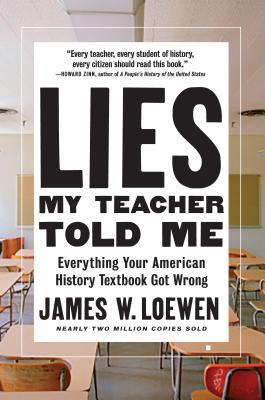- The Good: Eye-opening critique of distorted American history textbooks
- The Bad: Extremely negative and depressing
- The Literary: Some first-hand historical sources!
In this 1996 American Book Award winner, Professor James Loewen dissects eighteen high school American history textbooks, critiquing their content and style. History should be interesting and memorable. Instead, the books are full of omissions, misinformation, and blind patriotism thanks to the conservatives who sit on textbook adoption boards.
The premise of this book really resonates with me. I find that I barely remember the content of my middle and high school history classes. Sure I remember the basics, but I also remember how incredibly boring history classes were. Just a bunch of old white men and dates. But Lowen takes a critical look at the way history is taught in our schools, which makes it particularly difficult to remember long term. Instead of teaching stories, we teach children dates. Instead of describing real humans with real internal struggles, we leave out the parts that are uncomfortable or that don’t fit with a nationalistic message of American pride.
Several chapters focus on the “discovery” of America by Columbus and all that textbooks leave out about the native peoples who populated the continent well before Europeans arrived. As a member of the Cherokee Nation, my family openly talks about the white settlers who infiltrated our land and decimated our ancestors. So even as a student I recognized the dissonance between these two narratives.
I realized the American story taught in history books wasn’t a story of Native Americans but a story of white Americans. Even before whites arrived, Cherokees weren’t savages; they lived in houses and farmed the land. But Cherokees weren’t the peaceful at-one-with-nature stereotype either; they viciously warred with neighboring tribes, and by the 1800s many elite Cherokees were slave owners. Today, the Cherokee Nation is strong, but faces many modern issues, both governmental and civic. But I never learned any of this from a high school history text book.
Needless to say, I completely agree that our students are getting short-changed when it comes to history. When kids like myself recognize they are being delivered a watered down version of history, that’s strike one. Then reduce history to a series of dates and wars, without discussing the why, and all you’re left with is rote memorization; nothing that ties students to the present day or provides an understanding of our current social, geopolitical, or racial climate. I particularly enjoy this book’s chapters about Reconstruction. And the implication that teaching poorer students that America is truly meritocratic amounts to an educational system that is detrimental to the working class.
But the devil is in the details. Loewen wants to present the non-eurocentric version of history, which is fantastic. In attempting to provide alternative views of history, he gives credence to some theories that lack historical evidence. Many of his examples are thrown out one after the other, with no context of their own. He also sometimes describes native societies eschewing technology in such a way that propagates stereotypes about minorities and vilifies progress.
The book jacket claims that Loewen “revives history, restoring the vitality and relevance it truly possesses.” But instead of providing a self-sustaining narrative, Loewen spends the entire book refuting the 12 textbooks. He’s constantly on the offensive; critique is his primary goal. The book serves more to prove textbooks are wrong than to reveal the a deeper more nuanced story of history. Combined with the subject matter, in which many dark and brutal topics are discussed relentlessly, the book is a real downer.
Recommended for anyone who thought high school history was the most boring subject but finds it fascinating as an adult!
